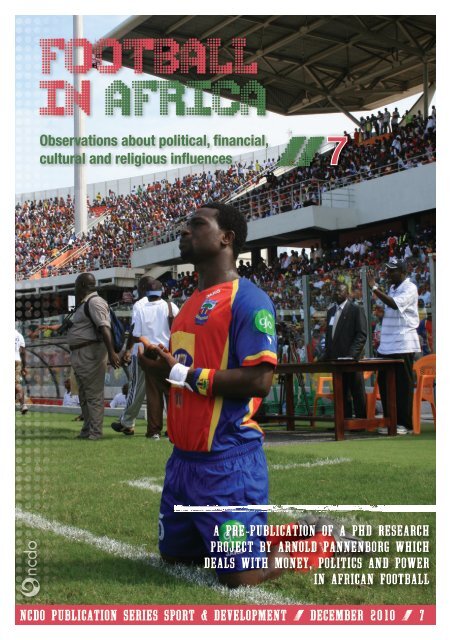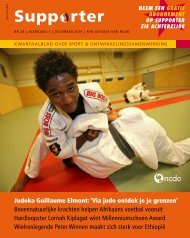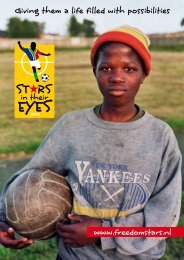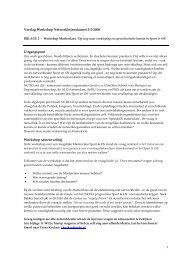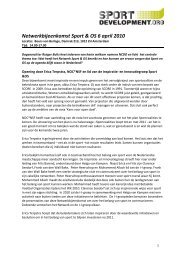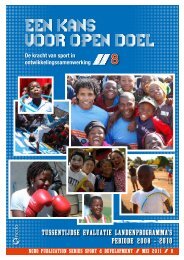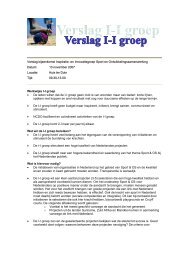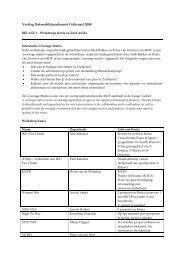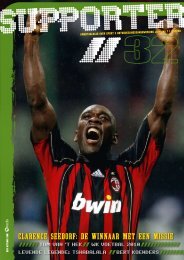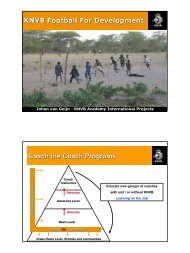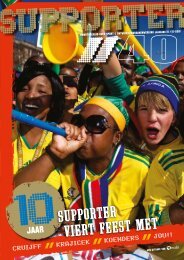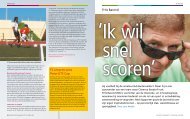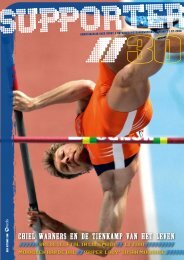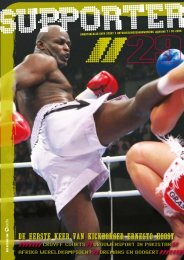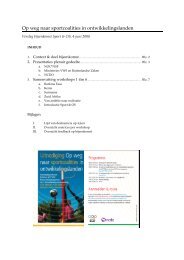FOOTBALL IN AFRICA - Sport Development
FOOTBALL IN AFRICA - Sport Development
FOOTBALL IN AFRICA - Sport Development
Create successful ePaper yourself
Turn your PDF publications into a flip-book with our unique Google optimized e-Paper software.
<strong>FOOTBALL</strong><strong>IN</strong> <strong>AFRICA</strong>Observations about political, financial,cultural and religious influences7A PRE-PUBLICATION OF A PHD RESEARCHPROJECT BY ARNOLD PANNENBORG WHICHDEALS WITH MONEY, POLITICS AND POWER<strong>IN</strong> <strong>AFRICA</strong>N <strong>FOOTBALL</strong>NCDO PUBLICATION SERIES SPORT & DEVELOPMENT / DECEMBER 2010 / 7
ABOUT THE AUTHORArnold Pannenborg (1976) is a cultural anthropologist who is currently finishing hisPhD research, which deals with money, politics and power in African football. Heperformed his first fieldwork in Cameroon in 2003. In 2008 his book How to Win aFootball Match in Cameroon was published by the African Studies Centre in Leiden.He spent six weeks in Ghana in 2008 for the African Cup of Nations. In 2009 and2010 he performed research in Ghana and Cameroon for five and four months,respectively. He has worked as an editor for the multimedia project ‘Twenty Ten’(see www.roadto2010.nl) and has written about African football for severalmagazines and websites. See also http://voetbalinafrika.web-log.nl.NOTE FROM THE AUTHORThis publication is based on a PhD research project in Ghana and Cameroon. Iwant to thank all the people who assisted me in one way or the other. Specialthanks goes out to Batambuh Mutia Jonathan and Amah Cleopas Chi. Withoutthem my fieldwork would surely have been less successful and pleasant. Gratitudealso goes out to Prof. Dr. Wouter van Beek (University of Tilburg) and to Helga vanKampen and Edwin van Timmeren (NCDO). Finally, my thanks goes out to SanneTerlingen who accompanied me during my fieldwork and who took most of thephotos printed in this publication.
Photo: Arnold PannenborgHundreds of school boys show up for the recruitment period of an Elite One league club in Bamenda, Cameroon.4
CONTENTS //Introduction 6ORGANIZATION 8MISMANAGEMENT 13<strong>IN</strong>FRASTRUCTURE 18THE DREAM 23POLITICS AND POWER 27RELIGION 32EPILOGUE 38All observations 40Further reading 435
<strong>IN</strong>TRODUCTIONThese days sports have become intimately intertwined with development issues.Individuals, organizations and companies are using sports – and football inparticular – to achieve development goals, not in the least the UN Millennium<strong>Development</strong> Goals. But football is not value-free. In Africa the game is influencedgreatly by social, cultural, religious, economic and political factors.Academic research on sports development projects is still in its infancy. Indeed,more research and evaluation is necessary to ascertain which projects work andwhich do not, and why. This publication, however, is not an evaluation and does notintend to oppose or criticize any project. The goal is to shed some light on themajor themes in African football. Whoever wants to set up or strengthen footballprojects in Africa should be aware of some basic realities and take these intoaccount. The information is mainly based on the author’s PhD research and partlyon academic literature on the subject.The most important observations are that (1) the context within which footballdevelopment projects in Africa operate is more complex than one might expect,and that (2) football in Africa is almost never played for football’s sake. Theorganization of football is vast and complex and numerous powerful men (and a fewwomen) are involved in the sponsoring and running of the game. Many of them areprimarily interested in satisfying personal needs. Football is not always aboutscoring goals on the field of play; it is also about scoring goals in the world offinance and politics.This publication is divided into six sections. First, the formal and informalorganizational structures of football in Africa are highly hierarchical yet workdifferently from those in the West. Second, mismanagement and corruption infootball are a huge problem and conceal the fact that countries in Africa receive lotsof money from various donors. Third, football infrastructures at a grassroots levelare underdeveloped whereas governments invest in modern stadiums for politicalreasons.6
Fourth, the goals of football development projects may not be the same as those ofthe ones who play the game. Often, the dream is to start a career as a footballplayer in Europe. Fifth, football is used to bring peace and unity yet the game alsoleads to violence and fragmentation. The difference between football and politics inAfrica is practically non-existent. Sixth, traditional religious beliefs have found theirway into the game. This so-called juju or muti sometimes interferes withdevelopment projects.This publication may appear to be critical of the game in Africa. This is notintentional. The information presented is derived from academic research, not froma personal agenda against individuals or organizations. It is wonderful to see thatfootball is so immensely popular throughout the continent. People derive pleasurefrom playing and watching the game. There are numerous examples in which thegame benefits children and adults in personal and societal respects. In order to takeadvantage of the potential power of football, however, it is important to understandthe local context well. This publication aims to explain some of today’s realities inAfrican football.Around one thousand spectators watch an Elite One league match in Bafang, Cameroon.Photo: Arnold Pannenborg7
ORGANIZATION //Football development projects commonly work with local partners. This canbe an association, a league committee, a club, a village, a school. Whoeversets up a project in Africa should realize that football is organized differentlyand rather complexly. The official structure of an organization nevercorresponds to the actual situation.Football is the most popular sport in Africa. Each country has millions of supporters,hundreds of thousands of players, hundreds of clubs, and uncountablecompetitions and tournaments on all possible levels. It is common to see theso-called National <strong>Sport</strong>s Council (NSC) dealing with all sports in a given country.The top body in football is, of course, the football association (FA). Most countrieshave tried to professionalize the game and have League Boards that oversee thePremier League and the lower divisions.COMMITTEESPhoto: Sanne TerlingenLet us take Ghana as an example. The Ghana Football Association (GFA) runsfootball in all possible respects. There is a Premier League Board (PLB) responsiblefor organizing the Premier League and a Division One League Board (DOL) that runsthe Division One. The clubs have their own body, called the Ghana League ClubsAssociation (GHALCA). Football in Ghana also consists of a second division, a thirddivision, a juvenile league, a women’s league, and so on.The GFA consists of numerous committees, each with its own jurisdiction andresponsibilities. Here follows an incomplete list of the committees in Ghana: theDisciplinary, Appeals, Referees, Legal, Finance, Technical and <strong>Development</strong>,Research and Information Management, Event Management, Football<strong>Development</strong>, Medical, and International Relations Committee. Each national teamalso has its own committee: the Black Stars Committee, the Black StarletsCommittee, the Black Queens Committee, and so on.PRESTIGEThe GFA, PLB, DOL, GHALCA and the committees are all organized in the samemanner. The most important person is the chairman, followed by the vice-chairman,the treasurer, secretary, and other members. There are people responsible formarketing, communication, and many other aspects that need attention. Whoeverenters an FA’s headquarters will notice that dozens of people work there. Every dayclub officials, referees, players, coaches and journalists visit the premises for onereason or the other.9
ORGANIZATIONOne of the most important things that I noticed during my research is that positionsin football are highly prestigious. An FA chairman prefers to call himself ‘president’and his presence alone commands the utmost respect. Whoever deals with an FAor a club will learn that no decision can be taken without the president himself. Ifyou want to establish a working relationship with an organization in football, it is vitalto know who is in charge. You have to be very careful not to offend anybody.BIG MANAnyone who holds a formal position will exhibit what Westerners would call‘arrogant’ behaviour. This does not only apply to FAs but also to committees,league bodies, clubs and even to seemingly insignificant grassroots organizations.There is a strict hierarchy and you do not want to make the mistake ofunderestimating who is in power. The academic R. Price labelled this the ‘Big ManSmall Boy Syndrome’. The Big Man controls and gives orders, the Small Boy obeysand does not dare to speak his mind.An important thing to realize is that in Africa most relations are characterized asthose between a patron and a client. This so-called system of patronage is visible inall levels of football. A wealthy and powerful man (sometimes a woman) takes aposition within the FA or a club and then assumes total control. He (or she) uses theFA or club to rally supporters, mostly for prestigious or political purposes. Oneconsequence is that many employees in football organizations are hired as a‘favour’, not because they have the relevant skills and experience for the job.“The Big Man controls and gives orders, the Small Boyobeys and does not dare to speak his mind.”10
A management member of Hearts of Oak waves the flag of his club at the Ohene Djan Stadium in Accra, Ghana.Photo: Sanne TerlingenOBSERVATIONS:- Be aware that the football structures in any given African country are more complex than youmight think. Familiarize yourself with the formal and informal structures. FAs also haveregional offices who control football in the area. If your project interferes with officialstructures, you have to deal with the proper authorities.- When you want to work with an organization in football, make sure to get an appointmentwith the person in charge. If you want to collaborate on a communications level, it is notenough to talk to the communications officer. The person on top of the organization(chairman, president) could feel offended.- Be aware that in Africa the wealthy and powerful people who control football take theirpositions very seriously and, in return, their status is taken very seriously by others. It is quitecommon to see that the administrators use football funds for their own travelling, accommodation,dining and other forms of spending of which they think come with the job butwhich others may find perhaps too luxurious.- Football clubs are commonly sponsored by wealthy individuals. The phrase ‘he who pays thepiper calls the tunes’ is used to signify that the person who contributes his money makes thedecisions. The other executives are only there for ‘make-up’, as one coach said. Even clubsat a grassroots level often have a rich individual at the helm.- Know that there are numerous unofficial football events in villages, districts and regions.11
ORGANIZATIONSuch events are commonly sponsored by wealthy individuals, in many cases with the aim ofpromoting themselves and their businesses. A lot of prestige and politics is at stake here. Itmay sometimes be better to support an existing event instead of your own. You may angerpowerful people when you start a project that competes with their own events.FURTHER READ<strong>IN</strong>GThis is a classic study of the social-cultural relationship between important and much lessimportant people, which explains the roles in bureaucratic organizations:- Price, R. (1974). ‘Politics and Culture in Contemporary Ghana: The Big-Man Small-BoySyndrome.’ Journal of African Studies, 1:2.This is an account of how the football association in Uganda works:- Schatzberg, M.G. (2010). ‘Les Complexités de la “Démocratie”: La Fédération Ougandaise deFootball en Tant que “Polity”.’ Politique Africaine, 118.More about how wealthy individuals organize tournaments for prestigious reasons:- Manirakiza, D. (2010). ‘Football Amateur au Cameroun: Entre Clientélisme Politique etÉchanges Mutuels.’ Politique Africaine, 118.<strong>IN</strong>FORMAL TOURNAMENTS <strong>IN</strong> CAMEROONNumerous football competitions and tournaments are organized outside the officialchannels. In Cameroon, informal tournaments called interquartiers are hugely popular andwell-attended events throughout the country. Young and old players set up teams in everyquarter to compete for fun, prestige and trophies. Also, the Brasseries companies areheavily involved in football. They used to organize the Top Cup competition for youngchildren to develop football at a grassroots level. Schools and universities organizetournaments for children and young adults as well. Former players also form ‘veteranclubs’ to play football during the weekends, thereby forging social and business networks.And then there are Cameroon’s end-of-year matches. Individuals commonly organizematches around New Year involving the best locally-based players and local players whoare now playing abroad. For instance, Ajax-player Eyong Enoh and others fly back home tomeet family and friends and to play the well-attended end-of-year match in Buea.12
MISMANAGEMENT //Players of Ghana’s top club Asante Kotoko sit in the dug-out at the stadium in Sunyani, Ghana.Photo: Sanne Terlingen13
MISMANAGEMENTSeveral countries in Africa feature prominently on Transparency International’sCorruption Perception Index. Mismanagement happens in football as well.Research by African journalists indicates that corruption and mismanagementruin the game in Africa. From projects at the top to the grassroots level:everybody will have to deal with this issue.Mismanagement and corruption in Africa go by many names: a ‘little something’, a‘gift’, a ‘motivation’, an ‘envelop’ or a ‘dash’. Most of them refer to eating – indeed,‘to eat’ means people using public money for private purposes. Nigerians call it‘sharing the national cake’ which tells you that the practice is to some extentlegitimized. Indeed, corruption is institutionalized in the majority of African countries.For instance, the government in Cameroon stays in power by allowing their civilservants to use their positions to get rich.There is really no difference between civil servants and football administrators. Aposition at the FA, a committee or a club is usually very profitable. All over Africapeople fight to get a position in the football scene. The fact is that there are billionsof dollars going around in football. There may not be as much money in Africa asthere is in Europe, but the commercialization has brought millions of dollars inAfrican football as well.PRIVATE POCKETSResearchers Sugden and Tomlinson argue that it is not corruption in football per se,it is the ‘scale of it’ that is most worrying. The famous Cameroonian goalkeeperJoseph-Antoine Bell once claimed that 90 out of 100 dollars in football disappearsin private pockets. Corruption is bad because it demoralizes the players. Forinstance, the bonuses that should go to national team players are usually neverpaid. Corruption is also bad because the money is not spend on developing thegame in Africa.A lot of money is being pumped into African football by companies whose corebusinesses are mining, agriculture, oil and gas, beverages and otherwise, but alsoby international sports companies such as Adidas and Puma and by televisionnetworks on the continent. There is also money coming in from other types ofsponsorships and FIFA development projects. Much of the funds are earmarked forgrassroots development but one only has to see the poor football facilities in Africato notice that the money may be spend elsewhere.14
Even the training facilities of Ghana’s top club Hearts of Oak are below standard.Photo: Sanne Terlingen“The famous Cameroonian goalkeeper Joseph-Antoine Bellonce claimed that 90 out of 100 dollars in football disappearsin private pockets.”DARK PICTUREAfrican journalists from an organization called FAIR wanted to know what happenswith the money. Their report Killing Soccer in Africa paints a dark picture. FA-officialsin Ivory Coast, Zimbabwe, Cameroon, Nigeria, Zambia and other countries arebusinessmen and politicians who make money and become more powerful frombeing involved in the game. President Jacques Anouma of the Ivorian FA evenrefused to explain how his administration spends its money.One of the main problems with corruption and mismanagement in African football isthat the sector lacks accountability and transparency in income and expenditures.The other problem is that most of the top administrators are untouchables. They15
MISMANAGEMENTsimply don’t get punished for what they do. The African journalists who researchedtheir FAs accused FIFA of keeping the corrupted in power. When a governmentwants to investigate malpractices within the FA, FIFA steps in and tells them thatpoliticians are not allowed to intervene in football-related affairs.LOCAL LEVELWhy is this relevant for football projects at a grassroots level? Are FIFA, the FAs andthe top clubs not a completely different world? Perhaps. But realize that corruptionand mismanagement happens on all levels. There is corruption in the constructionof pitches, training centres and stadiums; the transfer of football players; the payingof bonuses and salaries for players and coaches; and much more. These thingsoccur both on the top level and on a local level.One thing to repeat here is the fact that Africa receives millions of dollars forgrassroots football development. But recall Nigerian FIFA executive committeemember Amos Adamu who was suspended in 2010 for wanting to sell his vote inreturn for synthetic pitches in his country. The money (800,000 dollars) wassupposed to be transferred in his private account. This is another example whichtells you that people abuse the fact that donors want to spend money on footballdevelopment in Africa.OBSERVATIONS:- Be very careful whom you choose to work with. There are many people who are notinterested in developing football but who merely want a ‘piece of the cake’. Also important toknow is that administrators who were punished for corruption nevertheless often return tofootball management.- Accountability and transparency are two words that mean little in African football. Indeed,club owners and administrators often do not feel that they should inform the public abouttheir financial affairs. When setting up a project, be sure to ask for detailed accounts ofincome and expenditures.- There is more money in African football than you might think. People look at the sorry stateof grassroots facilities and want to construct or renovate pitches, training centres, and so on.There is money to do that. It would be interesting to see if that money could be spend on agrassroots level. This requires research and insights into the practices, politics andorganization of football.16
FURTHER READ<strong>IN</strong>GRead this classic study on politics, power and corruption in Africa:- Bayart, J-F. (2009). The State of Africa: The Politics of the Belly. Second Edition.Cambridge: Polity Press.These academic researchers describe the corruption in African football:- Sugden, J. & A. Tomlinson (2003). Badfellas: FIFA Family at War. Edinburgh/ London:Mainstream Publishing.African journalists from FAIR researched football administrators in eight countries:- Rukuni, C. & E. Groenink (eds.) (2010). Killing Soccer in Africa. FAIR TransnationalInvestigation. Download the report at www.fairreporters.org.Another Cameroonian journalist infiltrated in his country’s FA:- Nang, J-L. (2009). Desperate Football House: Six mois dans l’enfer de la Fécafoot. Yaoundé:Inter Press.Read these works about the situation in Kenyan football:- Munro, B. (2005). ‘Greed vs. Good Governance: the fight for corruption-free football inKenya.’ Paper presented at the 4th World Communication Conference on <strong>Sport</strong> and Society,November 6-10, Copenhagen, Denmark. Download the paper at www.playthegame.org.- Adelakun, T. & B. Cullum (2007). ‘Chaos in Kenya.’ New African Soccer no. 7, April.- Nyamjom, O. (2010). Foul play! The crisis of football management in Kenya. Download thereport at www.africog.org.Read more about FIFA and power politics in Africa:- Sugden, J. & A. Tomlinson. (1998). FIFA and the Contest for World Football: Who rules thePeoples’ Game? Cambridge: Polity Press.- Jennings, A. (2006). Foul! The Secret World of FIFA: Bribes, Vote Rigging and Ticket Scandals.London: Harper<strong>Sport</strong>.FIFA AND DEVELOP<strong>IN</strong>G THE GAME <strong>IN</strong> <strong>AFRICA</strong>Football development projects in Africa are often used for political purposes. FIFA spentmillions of dollars on developing football in Africa by constructing offices, training facilitiesand synthetic pitches. This could very well have been done with the best of intentions.Journalists, among whom Andrew Jennings, nevertheless claim that FIFA president SeppBlatter is mostly interested in obtaining votes from Africa’s football administrators. They saythat he cleverly uses the democratic principles of FIFA’s voting system. These principlesstate that all 208 members, great and small, each have one vote. Africa consists of manycountries and so the continent is a lucrative source of voting power. FIFA’s developmentprojects (‘Goal!’ And ‘Win in Africa with Africa’) are used to make friends among Africanfootball administrators. These administrators see how FIFA is helping them out in no smallway. The question is who they will vote for at FIFA’s next presidential election.17
Photo: Arnold PannenborgElite one league club Yong <strong>Sport</strong>s Academy takes on Sable Batie at the Municipal Stadium in Bamenda, Cameroon.18
<strong>IN</strong>FRASTRUCTURE //Cameroon is one of Africa’s most prominent football nations. The footballinfrastructure, however, is absolutely below standard and the same goes forthe rest of Africa. There is a structural lack of pitches, goalposts, nets, balls,jerseys, boots. Before you start constructing pitches or sending jerseys, thereare a few things you should know.The stadium in Bamenda (Cameroon) is nothing but a wall around a gravel pitch.Goats walk freely inside the premises. At least six football teams practice here on adaily basis. Making a sliding is a ticket straight to the hospital. A club owner recentlyspent a lot of money for the refurbishment of the pitch and the stadium. The onewho received the money ran away and was later arrested. The stadium actuallybelongs to the football authorities in the capital Yaoundé. But supporters inBamenda claim that they refuse to send money.‘Africans play football in the streets,’ said Ajax- and Cameroonian player EyongEnoh in 2010. ‘We don’t learn football in the stadium. We play at the back of thehouse, in the street, at school playgrounds.’ All over Africa football infrastructures atthe grassroots level are almost completely missing. Even the top clubs practice onlousy fields that are not their own. Even these clubs are struggling to get balls andjerseys. But is that because of a lack of money or a lack of management?STADIUMSMost of the money is invested in constructing large structures, such as stadiumsand training complexes. Every other year an African country will build or renovatefour state-of-the-art stadiums with matching grass pitches as host of the AfricanCup of Nations. Angola did it in 2010, Ghana in 2008, Egypt in 2006, Tunisia in2004 and Mali in 2002. These stadiums cost millions and millions of dollars. Manyof them were constructed by Chinese firms in exchange for fishing rights or otherbusiness contracts.Cameroon is a good example. The FA and the Ministry of Youth and <strong>Sport</strong>s made adeal with both telecommunications company MTN and Chinese firms to constructand renovate at least ten stadiums. Another example is Ghana, a country that nowboasts of four ultramodern stadiums, thanks to the African Cup of Nations. Thesestadiums are contrasted by the sorry state of the other football centres in thecountry. There is money alright. The question, however, is whether it is spend wisely.19
<strong>IN</strong>FRASTRUCTUREPOLITICSFirst, there is a lot of politics in the construction of stadiums. Of course, politiciansbenefit from staging international tournaments and are thus prepared to spendmoney on modern stadiums. The same applies to the location. One prominent caseoccurred in Cape Town (South Africa) where FIFA’s selection of the Green PointStadium was a bad choice in terms of commercial survival and the development offootball at the grassroots level. Ghana constructed one stadium in the middle ofnowhere. It is already called a White Elephant because most supporters cannotafford to pay the fare to get there.Second, local clubs complain about not being allowed to use the pitches andstadiums for practice purposes. Although there are some grass and syntheticpitches in each African country, most players still play on gravel and sandy pitches.Third, Africa suffers from what has been called the ‘lack of the art of maintenance’.The stadium in Accra (Ghana) is only two years old but recent reports indicate thatthe structure is already on a ‘slippery slope of deterioration’.GRASSROOTSAfrica needs football infrastructures at a grassroots level. Large stadiums are usefula few times a year, but well-maintained training facilities throughout the country aremore beneficial to the development of the game. One thing to remember is thatpoor infrastructures increase levels of intimidation and violence. League centres invillages and small towns commonly lack inner perimeters which makes it easy forspectators to enter the field of play. Violence against the referees, unfortunately,happens on a structural basis.“Most of the money is invested in constructing large structures,such as stadiums and training complexes.”OBSERVATIONS:- When you get involved in a project to develop grassroots infrastructure, you should thinkabout implementing plans and organizational structures for ownership and responsibilities.Who will be in charge when you leave?- A related issue is the question of maintenance. Once a stadium or training complex is set up,20
The referee and his linesmen are escorted off the pitch immediately after a match atthe Essipong Stadium in Sekondi, Ghana.Photo: Sanne Terlingenthe infrastructure soon suffers from degradation. Even a famous academy such as the Kadji<strong>Sport</strong>s Academy in Cameroon, set up after the World Cup in 1994, has seen better days.Make sure to have a working plan for maintenance.- Whether you are getting involved in the construction of infrastructure or whether you simplywant to provide teams with jerseys, balls and boots, you need to ask yourself the question ifa local person could do the same thing. There are a lot of wealthy Africans who could easilysponsor such projects themselves.- Constructing infrastructure is not enough. Football demands medical and security personnel,and other specialists. Football authorities do not always hire the best and most professionalstaff to perform these duties. There is a link between poor infrastructure and non-professionaland ill-equipped personnel on the one hand and violence and, sometimes, deaths on theother. When organizing a prestigious match, these issues need to be taken care off.- One important aspect is that football infrastructures – training facilities, pitches, stadiums– are all attached to plots of land. You will have to negotiate with the owner of the land (thechief) and it is essential to have him bless the field. Pleasing the ancestors is a vital elementof success.FURTHER READ<strong>IN</strong>GMore about football infrastructures and politics in Africa:- Alegi, P. (2007). ‘The Political Economy of Mega-Stadiums and the Underdevelopment ofGrassroots Football in South Africa.’ Politikon, 34, 3.- Alegi, P. (2008). ‘A Nation to be Reckoned with’: The Politics of World Cup StadiumConstruction in Cape Town and Durban, South Africa.’ African Studies, Vol.67, No.3.More about intimidation and violence in African football:- Igbinovia, P.E. (1985). ‘Soccer Hooliganism in Black Africa.’ International Journal of Offender21
<strong>IN</strong>FRASTRUCTURETherapy and Comparative Criminology, 29, 2.- Burnett, C. (1998/99) ‘Understanding Soccer Violence as a Sociological Phenomenon in theSouth African context.’ Journal for Research in <strong>Sport</strong>, Physical Education and Recreation, 21, 1.This study deals with the background of South Africa’s biggest-ever football disaster:- Alegi, P. (2004). ‘Like Cows Driven to a Dip’: The 2001 Ellis Park Stadium Disaster in SouthAfrica.’ Soccer & Society, 5, 2.VIOLENCE AND DISASTERS <strong>IN</strong> <strong>AFRICA</strong>N <strong>FOOTBALL</strong>Violence on the football fields in Africa is very common. With a few exceptions, violence isnot organized but rather spontaneous. Most of the anger is directed at the referee and theplayers, coaches and officials of the opponent team. There are towns in Ghana where awayteams never leave without a few bruises, or worse. The general rule is that you cannot winaway matches. There is so much pride and politics involved that losing a home match is notan option. This is true for top league matches as well as village matches. Good infrastructuresand security personnel are mostly absent in the villages, increasing levels of violence.Sometimes things get out of hand. Two of Africa’s worst stadium disasters happened in2001, first in South Africa, then in Ghana. Every year many supporters die in stadiums inAfrica. Researchers argue that inadequate infrastructures, contempt for spectator safety onthe part of the administrators and non-professional security personnel are the prime causes.Mismanagement worsens the situation (people are allowed in when the venue is alreadyfull). Sound management practices and well-trained personnel could do much to alleviatethese problems.Photo: Sanne TerlingenMedical personnel is ready to assist any injured player during a match at the Len Clay Stadium in Obuasi, Ghana22
THE DREAM //This ball boy dreams of playing for a major club home or abroad one day.Photo: Sanne TerlingenFootball projects in Africa deal with a multitude of issues: unity and peace,women’s rights, HIV/AIDS. The game is seen as the ideal way to realize theUnited Nations Millennium <strong>Development</strong> Goals. In Africa itself the ideas aboutfootball are quite different. Football players and their families usually think ofone thing only: how to get to Europe to jumpstart a professional career.Jan Mulder and Abdelkader Benali travelled to Africa in 2010 for a television seriesabout football. In Ivory Coast they followed a young football player to his parentalhouse. They wanted to see the living conditions and meet the player’s family. Butthe visit undoubtedly had an unforeseen side-effect. The player and his parentswere under the impression that the foreigners were going to take him to Europe.Why else would a television crew walk into their humble residence?When you ask older players about their early years, they all say that their fathersdidn’t want to see them playing football. It was not considered a proper careerwhich would lead to respect and a decent salary. Times have changed. Now thatDidier Drogba, Samuel Eto’o and Michael Essien earn millions of dollars a year,playing football is an acknowledged route to wealth and fame. Ask any youngplayer what his dreams are and he will say that he wants to become the newDrogba or Eto’o.23
THE DREAMMUSCLE DRA<strong>IN</strong>The goals of football projects can be very different from those of the playersthemselves. Projects are usually aimed at making life better for Africans in Africa. Infootball, however, everybody wants to make his or her life better somewhere else.The so-called ‘muscle drain’ is enormous: thousands of African players leave thecontinent to find employment in Asia, the Middle East, the United States andEurope. Some researchers call the trade a form of ‘exploitation’ and ‘neocolonialism’by the West. On the other hand, a family or village can definitely profitfrom a player’s career.The trade in African players is so great that there are thousands of footballacademies on the continent. Some of them will make the players go get aneducation to prepare themselves for a life outside of football. Most of the academiesare illegal and are run by dubious characters who want to make a quick buck. A lotof players are also transferred through the clubs. Researchers argue that the tradeis killing football in Africa. Indeed, local leagues have lost much of their popularitydue to the exodus of players.Photo: Arnold PannenborgThe rich and famous players of Ghana’s national team leave the military airport in their private vehiclesafter having played a World Cup qualifier in Sudan.24
“The goals of football projects can be very different from those ofthe players themselves.”BIG BUS<strong>IN</strong>ESSWhy is it important to know all this? Because the trade in African players is bigbusiness. Since there is a lot of money to be made, you will see many powerfulindividuals contracting or supervising young football talents. You and your projectare thus operating in a context where money and power come together. Incountries such as Ghana and South Africa it was discovered that club officials andfootball administrators conspire to sell as many players as possible. They all taketheir share of the profits.The results are that many young players find themselves at the mercy of unscrupulousagents. Researcher Poli argues that most African players end up in the lower leaguesin Europe and elsewhere. Some of them were cheated and now live their lives in thestreets of Europe’s major cities. The situation is that there are projects in Africa thatinform young players about the dangers of HIV/AIDS whereas the same players donot know anything about signing contracts. Football may be an important tool fordevelopment but there are many issues in the game itself that need attention.OBSERVATIONS:- Keep in mind that the goals of your project are most likely very different from those of thepeople you are working with. While you want to provide some support in, say, education, theymay think that you are their ticket to Europe. So be aware that their expectations of theproject may not be the same as yours.- Familiarize yourself with the context you are in. The trade in African players is booming andnumerous Africans are involved. Usually they are businessmen or politicians, so be carefulnot to get in the way of such powerful individuals. They can make life very difficult.- One rule on the player transfer market is that young players are more valuable than olderplayers. Cheating with ages is widespread and several researchers and African journalistsclaim that it hinders the development of the game in Africa. Be careful if you are trainingyoung players. They may be older than you think.- Some managers of football development projects have tried to avoid entering theseprestigious and political environments by setting up two teams. One team consists of boysand girls who just want to play for fun; the other team consists of young talented playerswhose dream is to have a football career. Only the latter team operates in a field where thepolitical and financial stakes are high.25
THE DREAMFURTHER READ<strong>IN</strong>GThe works below all deal with the exodus of African players:- Lanfranchi, P. & M. Taylor (2001). Moving with the Ball: The Migration of ProfessionalFootballers. Oxford: Berg.- Bale, J. (2004). ‘Three Geographies of African Footballer Migration: Patterns, Problems andPostcoloniality.’ In: Armstrong, G. & R. Giulianotti. Football in Africa: Conflict, Conciliation andCommunity. Basingstoke and New York: Palgrave Macmillan.- Poli, R. (2006). ‘Africans’ Status in the European Football Players Labour Market.’ Soccer &Society, 7, 2.- Poli, R. (2006). ‘Migrations and Trade of African Football Players: Historical, Geographical andCultural Aspects.’ Afrika Spectrum, 41, 3.- Darby, P. (2007). ‘Out of Africa: The Exodus of Elite African Football Talent to Europe.’WorkingUSA: The Journal of Labor and Society, Vol. 10, December.- Darby, P., G. Akindes & M. Kirwin (2007). ‘Football Academies and the Migration of AfricanFootball Labor to Europe.’ Journal of <strong>Sport</strong> & Social Issues, 31.- McDougall, M. (2008). ‘The scandal of Africa’s trafficked players.’ The Observer. 6 January.THE <strong>FOOTBALL</strong> PLAYER AS A POPULAR ICONFootball stars like Didier Drogba and Samuel Eto’o have become global icons. Theytranscend their role as mere footballers and are seen as symbols of the entire nation. Incountries with political and economic difficulties these stars can lift the spirit of the people.Researcher Poli, however, argues that such icons receive a disproportionate amount ofmedia attention in their respective countries. He says that the media are responsible forcreating a ‘one-sided’ image of African players in European competitions. The fact thatsome African players are leading a homeless existence in major European cities hardly everappears in newspapers. Nevertheless, many football stars take their role as icons seriously.They are aware of their status and behave as role models for young people in Africa. DidierDrogba, for instance, is an ambassador for the United Nations <strong>Development</strong> Programme(UNDP). Samuel Eto’o is setting up a football academy in his native country. He has also sentambulances to Cameroon. The Nigerian Nwankwo Kanu set up the Heart Foundation.26
POLITICS AND POWERFootball unites divided countries and helps bring peace to war-torn countries.At least, that has been the message in the media. But football in Africa canequally lead to divisiveness and violence. The game’s power to divide isrelated to its strong link to ethnicity and politics. Whoever sets up a projectin Africa should realize that football is definitely not always played forfootball’s sake.Numerous football projects aim to bring some sort of unity and peace in violentplaces in Africa. Football is said to have the power of healing. Liberia and IvoryCoast are the two most cited examples. When Liberia’s Lone Stars played aninternational match, so the story goes, the rival factions laid down their guns andsat side by side in the stadium. Didier Drogba, the captain of the Ivorian nationalteam, organized a match in the rebel-dominated city of Bouaké and pleaded hiscountrymen to stop fighting.The situation in Liberia and Ivory Coast is still precarious. From the scarce researchon this subject it can be concluded that the power of football should not beoverestimated. Researcher Armstrong argues that football brings a sense of peacefor the duration of 90 minutes only. The game does not change existing powerrelations, infrastructural underdevelopment, and massive unemployment. WhetherDrogba’s contribution to peace was as decisive as people say it was, is debatableas well.Photo: Sanne TerlingenPowerful men often bypass the coach in selecting players for the team for prestigious and political purposes.28
BLACK STARSAnother example comes from Ghana. President Kwame Nkrumah used the nationalteam as a vehicle through which to spread his nationalistic and pan-Africanisticideology. The Black Stars won the African Cup of Nations in 1963 and 1965. AfterNkrumah was deposed in 1966, the national team slumped into misery for severalyears. He also created a club named Real Republikans. Instead of promoting hisideals, the club caused a rift between the government and the Ashanti people. Thisdivision is still alive in the violent encounters between Hearts of Oak and AsanteKotoko.So be aware that the power of football may not be as great as you might think. Infact, a word of caution is in order here. Football in Africa is predominantlydetermined by ethnic factors. Ethnicity is a very complex concept, which wasproven again by the outbreak of violence after Kenya’s 2007 presidential elections.All of a sudden, one of Africa’s most popular tourist destinations had fallen into the‘ethnic trap’. But experts already feared such a thing might happen one day.ETHNIC GROUPSThe most successful and widely supported clubs in Africa belong to specific ethnicgroups. Cameroon is a notable example. Some of the major ethnic groups – Béti,Bamiléké, Bassa and Duala – all have their own clubs. Matches between theseclubs are always tense and violent because Cameroonians see them as a mirror ofpolitical life. Whoever wins the match also ‘wins’ in the political domain. Football inCameroon has actually worsened the animosity between these ethnic groups.Do not think that these things only happen in top-level football. I once heard a storyabout a Dutch researcher who was asked to officiate a match between two villages.At first sight there was nothing at stake, except maybe a bit of pride. Who wouldwin or lose did not seem to matter. But it did. There were a lot of (political)disagreements between the two villages and both parties desperately wanted towin. The researcher understood the context and managed to end the match in a0-0 score.VIOLENCEIf it is argued that football brings peace, then it is only fair to state that footballbrings a lot of violence too. The best example in recent times were the World Cupqualifiers between Algeria and Egypt in 2009. The tension became so great that29
POLITICS AND POWEReven politicians made comments denouncing the opponent. Rocks were thrown atAlgeria’s team bus in Egypt. When the decisive match was played on neutral ground(Sudan), thousands of policemen and military personnel were called up to keep thepeace.Football equals politics in Africa. The phrase that ‘sports and politics don’t mix’ wasonce called ‘hypocritical’ by a Nigerian Minister of <strong>Sport</strong>. It is rather the other wayround: football is the perfect political tool. Africans understand this very well. Footballis the continent’s most popular sport and whoever attaches his name to the gamebecomes famous as well. We all know the example of George Weah, World Player ofthe Year in 1995, who participated in the presidential elections in Liberia.TOURNAMENTSThe political impact of football is especially visible during high-profile tournaments.South Africa hosted the 1996 African Cup of Nations after the end of apartheid.Dictators also know the value of such events. Sani Abacha, Mobutu Sese Seko andIdi Amin all cashed in on football’s positive image. One of the worst cases happenedprior to the African Cup of Nations in 2010. The politically motivated decision by theAngolan government to organize group matches in the contested enclave ofCabinda backfired horribly when the Togolese team bus was ambushed by rebels.“Research in Liberia has shown that football brings a senseof peace for the duration of 90 minutes only.”OBSERVATIONS:- When setting up a football project, you may want to inform yourself of the political and ethniccontext. Which political party is in power? Which ethnic groups have political power? What isthe situation in the area where your project is based? These are issues that may directly orindirectly influence your project.- Football in Africa is used by governments, ethnic groups and political parties to gain andmaintain power. You may operate in a region where opposition to the government is great.Football development in such regions is often neglected or hindered by those in power. Itwould be wise to inform yourself of the ‘political reputation’ of the region.- Powerful people – businessmen, politicians, and so on – often interfere in football-relatedmatters for political reasons. For instance, they tend to impose their will on the team’sline-up. This happens on all levels. You will probably come into contact with individuals whowant to use the project for their own private purposes.- A consequence of the mixing between football and politics is that administrators commonly30
lack long-term strategies with regard to the development of the game. Be aware thatshort-term interests are often considered more important than long-term plans. This attitudemay affect your project.FURTHER READ<strong>IN</strong>GThese two articles deal with football in Liberia:- Armstrong, G. (2002). ‘Talking up the Game: Football and the Reconstruction of Liberia, WestAfrica.’ Identities: Global Studies in Culture and Power, 9.- Armstrong, G. (2004). ‘Life, Death, and the Biscuit: Football and the Embodiment of Society inLiberia, West Africa.’ In: Armstrong, G. & R. Giulianotti. Football in Africa: Conflict, Conciliationand Community. Basingstoke and New York: Palgrave Macmillan.These three studies deal with the link between football and politics:- Ndee, H.S. (2005). ‘<strong>Sport</strong> as a Political Tool: Tanzania and the Liberation of Africa.’International Journal of the History of <strong>Sport</strong>, 22:4.- Fridy, K.S. & V. Brobbey (2009). ‘Win the match and vote for me: the politicisation of Ghana’sAccra Hearts of Oak and Kumasi Asante Kotoko football clubs.’ Journal of Modern AfricanStudies, 47, 1.- Njororai, W.W.S. (2009). ‘Colonial Legacy, Minorities and Association Football in Kenya.’Soccer & Society, 10:6.Dutch journalist Edwin Schoon wrote a fascinating book about football and dictators in Africa:- Schoon, E. (2010). De macht van de Bal: Op reis door de geschiedenis van voetballend Afrika.Amsterdam: LJ Veen.<strong>FOOTBALL</strong> AND ETHNIC VIOLENCE <strong>IN</strong> CAMEROONFor years the Bamiléke and Béti ethnic groups have lived in mutual disagreement andhatred towards one another. President Paul Biya hails from the south of the country and isconsidered a Béti. Researchers argue that the Béti run political life through a system ofpatronage, favouritism and corruption. The Bamiléké are famous for their entrepreneurialspirit and have taken over many economic activities in the country. The Bamiléké criticizethe Béti for taking over the government and hence political power and the Béti fear theBamiléké for their economic strength. Matches between teams belonging to these groupscommonly lead to violence. Foudre d’Akonolinga (Béti) and Aigle Royal Menoua (Bamiléké)were pitted against each other in the semi finals of the Cup of Cameroon in 2008. WhenAigle Royal emerged victorious, Béti supporters of Foudre attacked Bamiléké residents inAkonolinga with stones, bats and machetes and plundered and set on fire numerousBamiléké shops in the area. The bloody clashes lasted for almost a week. One Bamilékéman was killed, several were wounded and dozens fled town.31
Photo: Sanne TerlingenA spiritual adviser or malam calls upon the spirits at his house in a town in Cameroon.32
RELIGION //Africans are deeply religious. Most of them are either Christian or Muslim andit is common to see players pray before the start of the match. There is also awidespread belief in witchcraft, sorcery and magic. This so-called juju or mutiis widely used in football matches. Whoever wants to set up a football-relatedproject should be aware of these spiritual practices.First of all, juju is not limited to the top leagues and national teams. A Cameroonianprofessor in cultural anthropology told me a story about a football match betweentwo primary schools in 2002. Both teams had hired a witchdoctor to perform juju.Soon after the match started, pupils of one school invaded the pitch and sprinkleda sort of oil near the goalpost. Everybody understood what they were doing andone journalist wrote that the children were seen as ‘heroes’. Pupils of the otherschool then ran onto the pitch and threw a coin inside the goalpost.It does not really matter which team won. The point is that primary school childrennot only knew about juju but also participated in these spiritual practices. Onewitchdoctor (or jujuman, spiritual adviser, malam, sangoma) later told me that it allmakes very much sense. “These children learn about juju from a very young age,”he said. “They see the players of the big teams performing juju on the pitch andimmediately want to copy what they are doing. That’s why these beliefs will nevercease to exist.”BELIEF SYSTEMJuju is known under many names. But whether one calls it juju, muti, gris-gris, wak,witchcraft, voodoo, magic, ‘ways and means’ or ‘African electronics’, it comesdown to the same thing. Juju is a belief system whereby specialists use plants,herbs, fetishes, animals, spirits and rituals to attain certain goals. There are differentforms of juju in football. A concoction – containing for instance the head of a cat, aneedle and a piece of paper with the names of the opponent team players – may beburied on the pitch or near the entrance to the stadium. Spirits too may appear onthe pitch to disrupt play.Juju is considered an African secret. It is aimed at weakening the opponent team togive one’s team more chances in winning the match. Juju brings luck to one teamand bad luck to the other. When one team finds out the type of juju of the otherteam, they can prepare themselves and neutralize the other team’s juju. That is whypeople are often reluctant to talk openly about it. Also, they tend to see everybodyas spies; people who are trying to find out their juju.33
RELIGIONSPOIL<strong>IN</strong>G THE HOTELJuju is also a very serious affair. The most important rule is that nobody is allowed tocome near the stadium before a match. The same goes for training grounds, teambuses, hotels and so on. They often feel that officials and supporters of theopponent team will come and spoil the pitch or the hotel. That is why most clubshire supporters who guard these places at night. A friend once forbade me to go tothe stadium the night before an important match. The following day he told me thatsupporters of the home team had burned torches near the stadium. Whensupporters of the opponent team tried to get inside, there were fights that lasted forhours.Many Africans and Westerners alike feel that juju works against development. Theyargue that players would rather undergo spiritual rituals than to train hard to improvetheir football skills. Some Africans are embarrassed by their continent’s ‘primitive’and ‘backward’ beliefs. No wonder that football administrators do not want to seejuju in football. Clubs are regularly fined for using juju during league matches. TheAfrican football federation CAF once forbade the use of juju during the African Cupof Nations. But will such measures work when even top administrators are knownbelievers?PSYCHOLOGYIt is difficult to say whether juju works. One witchdoctor in Cameroon sees himselfas a psychologist who brings the team together and gives the players confidence.“There are few psychologists in Africa,” he explained. “Here we use collective rituals.Sometimes I wake the players at midnight to sing songs. It brings the playerstogether.” Players throw prepared objects inside the goalposts. “When an attackerthrows a coin he will open the goalpost. When he scores a goal he will believe thatthe juju worked.” In short, whatever else juju does, it fulfils an importantpsychological function.“Children see the players of the big teams performing juju onthe pitch and immediately want to copy what they are doing.That’s why these beliefs will never cease to exist.”34
The goalkeeper of Asante Kotoko waves his white handkerchief, a known jujutalisman at the stadium in Sunyani, Ghana.Photo: Sanne TerlingenOBSERVATIONS:- Juju is considered an African secret. Players, coaches and officials commonly deny that theyare into juju and claim that they are Christians or Muslims and only pray. The fact is that themajority of football teams are in one way or the other involved in these spiritual practices. Donot let anyone tell you otherwise.- Witchcraft is an expression of jealousy and hatred. Unrest among players within your teammay be the result of witchcraft and juju. A popular player who has sustained an injury maythink that his team mate on the bench was responsible because he wanted to play himself.Also, an injured player commonly prefers to visit a traditional doctor.- Be aware that juju is a serious affair and that most supporters strongly believe in it. As amanager or coach of a football project, you should be careful in forbidding your players touse juju. First, juju is said to work on a psychological level and as such has a function infootball. Second, defeat may be attributed to your refusal to employ juju which could lead toproblems.- Well-intended football projects such as FIFA’s construction of synthetic pitches in Africa mayfind cultural practices to stand in their way. You should be aware of some of the basic beliefsin juju and ask yourself if they could hamper the progress of your project.- Much of the violence in African football is juju-related. Foreigners are not immune to suchviolence. I was once almost attacked by supporters who thought that I was hiding ‘juju’ inmy camera. One German coach in Cameroon told me that he was beaten unconsciousbecause his players were openly using juju. He had to be escorted by policemen and wentstraight to the hospital.35
RELIGIONFURTHER READ<strong>IN</strong>GThese works all deal with juju in African football:- Scotch, N.A. (1961). ‘Magic, sorcery and football among urban Zulu: a case ofreinterpretation under acculturation.’ Journal of Conflict Resolution, Vol.5, No.1.- Leseth, A. (1997). ‘The use of juju in football: sport and witchcraft in Tanzania.’ In: Armstrong,G. & R. Giulianotti. Entering the Field: Perspectives on World Football. Oxford: Berg.- Royer, P. (2002). ‘The spirit of competition: Wak in Burkina Faso.’ Africa, Vol.72, No.3.- Schatzberg, M.G. (2006). ‘Soccer, science, and sorcery: causation and African football.’ AfricaSpectrum, 41, 3.- Pannenborg, A. (2008). How to Win a Football Match in Cameroon. Leiden: African StudiesCentre.- Pannenborg, A. & S. Terlingen (2009). ‘Angst voor juju in synthetisch gras.’ Supporter, no. 36.- Terlingen, S. & A. Pannenborg (2010). ‘Behekste Ballen.’ NRC Weekblad, 12 June.Photo: Arnold PannenborgThe players of Asante Kotoko perform prayers before stepping onto the pitch in Sunyani, Ghana.36
HOW TO RECOGNIZE JUJU- Players jump over the wall of the stadium before the match;- The team bus drives straight onto the field;- Players refuse to change in the dressing room;- Players enter the field wearing the wrong colour jerseys;- Players refuse to shake the opponent’s hand;- Teams start the match with ten players each;- Players urinate on the pitch (to counter juju);- All the players line up side by side between the goalposts;- Players throw something into the opponent’s goalpost;- The goalkeeper hides something inside his goalpost;- Players hit the poles or crossbar several times during the game;- Players wear white handkerchiefs, necklaces and other ‘talismans’.JUJU AND SYNTHETIC PITCHESFIFA is constructing offices, training facilities and synthetic pitches all over Africa. Are suchsynthetic pitches resistant to local culture? Evidence from Swaziland and Ghana indicatesthat the answer is negative (and the lesson to learn is to always take into account the localcontext). The expensive artificial pitch in Swaziland has been heavily damaged by teamsperforming juju rituals. The burying of concoctions ruined the pitch almost beyond repair.Similarly, the new ‘astroturf’ in Tema (Ghana) soon led to violence. The teams in the PremierLeague all play their matches on grass or gravel pitches and asked the FA for approval topractice in the Tema Stadium the day before a match. But supporters and officials of TemaYouth became extremely violent every time an opponent dared to come near the stadium.Why? Because they feared that the opponent would bury concoctions inside the stadium.Violent encounters were common practice for almost two seasons. Tema Youth finallyrelegated in 2009 because the FA deducted six points for fielding an unqualified player. NoPremier League club has since used the synthetic pitch.37
Photo: Sanne TerlingenA ball boy watches a Premier League match at the Essipong Stadium in Sekondi, Ghana.38
EPILOGUE //The year 2010 (Twenty Ten) was a magical time for African football. For the first timeever the World Cup was held on African soil. Numerous development projects wereinitiated in the slipstream of the tournament. One of the main questions is whetherand in what ways South Africa – and the rest of the continent – benefited fromorganizing the world’s biggest sporting event. There were said to be majoreconomic gains. Profits of a few billion dollars and the creation of 159,000 new jobsin South Africa would be direct benefits. There were said to be ‘indirect’ gains in thesense that Africa would finally get rid of its image as a continent held back by war,corrupt leaders, HIV/AIDS and poverty. Instead, Africa was able to present itselffrom a positive angle.Several studies, however, already indicated that hosting major tournaments such asthe World Cup and the Olympics hardly ever leads to financial gain. South Africa toowas forced to lower its expectations. First, the organizers had to lower the numberof foreign visitors. Second, the World Cup did not create as many jobs as wasexpected. Third, the costs of hosting the tournament turned out to be much higher.Fourth, South Africans who wanted to run Bed & Breakfasts and who wanted to sellmerchandize and food in front of the stadiums found out that FIFA owns the WorldCup and as such completely dictated every commercial activity. Whether the imageof South Africa and Africa has improved remains to be seen.What about the infrastructural legacy of Twenty Ten? Ten ultramodern stadiumswere built in nine cities as well as many pitches all over South Africa. Also, roads,public transport and airports were improved significantly. Journalists andresearchers, however, questioned the long-term benefits of such infrastructuralprojects. From the African Cup of Nations in Ghana we learnt that the maintenanceof football stadiums is a major problem in Africa. Journalists Milikowski andHoekstra, among others, questioned the sustainability of Cape Town’s Green PointStadium in this respect.It is still wonderful that a country in Africa won the right to host the World Cup. Itmay have increased the popularity of the game in Africa even more. Time will tellwhether staging such a tournament will have contributed to the development ofSouth Africa and Africa in general. Maybe the overall lesson is that football indeedhas the potential of stimulating development in Africa but that we should notoverestimate the power of the game. More research is needed in this respect,which will certainly also benefit the potential success of football developmentprojects in Africa in the future.39
ALL OBSERVATIONS40- Be aware that the football structures in any given African country are more complex than youmight think. Familiarize yourself with the formal and informal structures. FAs also haveregional offices who control football in the area. If your project interferes with officialstructures, you have to deal with the proper authorities.- When you want to work with an organization in football, make sure to get an appointmentwith the person in charge. If you want to collaborate on a communications level, it is notenough to talk to the communications officer. The person on top of the organization(chairman, president) could feel offended.- Be aware that in Africa the wealthy and powerful people who control football take theirpositions very seriously and, in return, their status is taken very seriously by others. It is quitecommon to see that the administrators use football funds for their own travelling,accommodation, dining and other forms of spending of which they think come with the jobbut which others may find perhaps too luxurious.- Football clubs are commonly sponsored by wealthy individuals. The phrase ‘he who pays thepiper calls the tunes’ is used to signify that the person who contributes his money makes thedecisions. The other executives are only there for ‘make-up’, as one coach said. Even clubsat a grassroots level often have a rich individual at the helm.- Know that there are numerous unofficial football events in villages, districts and regions.Such events are commonly sponsored by wealthy individuals, in many cases with the aim ofpromoting themselves and their businesses. A lot of prestige and politics is at stake here. Itmay sometimes be better to support an existing event instead of your own. You may angerpowerful people when you start a project that competes with their own events.- Be very careful whom you choose to work with. There are many people who are notinterested in developing football but who merely want a ‘piece of the cake’. Also important toknow is that administrators who were punished for corruption nevertheless often return tofootball management.- Accountability and transparency are two words that mean little in African football. Indeed,club owners and administrators often do not feel that they should inform the public abouttheir financial affairs. When setting up a project, be sure to ask for detailed accounts ofincome and expenditures.- There is more money in African football than you might think. People look at the sorry stateof grassroots facilities and want to construct or renovate pitches, training centres, and so on.There is money to do that. It would be interesting to see if that money could be spend on agrassroots level. This requires research and insights into the practices, politics andorganization of football.- When you get involved in a project to develop grassroots infrastructure, you should thinkabout implementing plans and organizational structures for ownership and responsibilities.Who will be in charge when you leave?- A related issue is the question of maintenance. Once a stadium or training complex is set up,the infrastructure soon suffers from degradation. Even a famous academy such as the Kadji
<strong>Sport</strong>s Academy in Cameroon, set up after the World Cup in 1994, has seen better days.Make sure to have a working plan for maintenance.- Whether you are getting involved in the construction of infrastructure or whether you simplywant to provide teams with jerseys, balls and boots, you need to ask yourself the question ifa local person could do the same thing. There are a lot of wealthy Africans who could easilysponsor such projects themselves.- Constructing infrastructure is not enough. Football demands medical and security personnel,and other specialists. Football authorities do not always hire the best and most professionalstaff to perform these duties. There is a link between poor infrastructure and nonprofessionaland ill-equipped personnel on the one hand and violence and, sometimes,deaths on the other. When organizing a prestigious match, these issues need to be takencare off.- One important aspect is that football infrastructures – training facilities, pitches, stadiums– are all attached to plots of land. You will have to negotiate with the owner of the land (thechief) and it is essential to have him bless the field. Pleasing the ancestors is a vital elementof success.- Keep in mind that the goals of your project are most likely very different from those of thepeople you are working with. While you want to provide some support in, say, education, theymay think that you are their ticket to Europe. So be aware that their expectations of theproject may not be the same as yours.- Familiarize yourself with the context you are in. The trade in African players is booming andnumerous Africans are involved. Usually they are businessmen or politicians, so be carefulnot to get in the way of such powerful individuals. They can make life very difficult.- One rule on the player transfer market is that young players are more valuable than olderplayers. Cheating with ages is widespread and several researchers and African journalistsclaim that it hinders the development of the game in Africa. Be careful if you are trainingyoung players. They may be older than you think.- Some managers of football development projects have tried to avoid entering theseprestigious and political environments by setting up two teams. One team consists of boysand girls who just want to play for fun; the other team consists of young talented playerswhose dream is to have a football career. Only the latter team operates in a field where thepolitical and financial stakes are high.- When setting up a football project, you may want to inform yourself of the political and ethniccontext. Which political party is in power? Which ethnic groups have political power? What isthe situation in the area where your project is based? These are issues that may directly orindirectly influence your project.- Football in Africa is used by governments, ethnic groups and political parties to gain andmaintain power. You may operate in a region where opposition to the government is great.Football development in such regions is often neglected or hindered by those in power. Itwould be wise to inform yourself of the ‘political reputation’ of the region.41
ALL OBSERVATIONS- Powerful people – businessmen, politicians, and so on – often interfere in football-relatedmatters for political reasons. For instance, they tend to impose their will on the team’sline-up. This happens on all levels. You will probably come into contact with individuals whowant to use the project for their own private purposes.- A consequence of the mixing between football and politics is that administrators commonlylack long-term strategies with regard to the development of the game. Be aware thatshort-term interests are often considered more important than long-term plans. This attitudemay affect your project.- Juju is considered an African secret. Players, coaches and officials commonly deny that theyare into juju and claim that they are Christians or Muslims and only pray. The fact is that themajority of football teams are in one way or the other involved in these spiritual practices. Donot let anyone tell you otherwise.- Witchcraft is an expression of jealousy and hatred. Unrest among players within your teammay be the result of witchcraft and juju. A popular player who has sustained an injury maythink that his team mate on the bench was responsible because he wanted to play himself.Also, an injured player commonly prefers to visit a traditional doctor.- Be aware that juju is a serious affair and that most supporters strongly believe in it. As amanager or coach of a football project, you should be careful in forbidding your players to usejuju. First, juju is said to work on a psychological level and as such has a function in football.Second, defeat may be attributed to your refusal to employ juju which could lead to problems.- Well-intended football projects such as FIFA’s construction of synthetic pitches in Africa mayfind cultural practices to stand in their way. You should be aware of some of the basic beliefsin juju and ask yourself if they could hamper the progress of your project.- Much of the violence in African football is juju-related. Foreigners are not immune to suchviolence. I was once almost attacked by supporters who thought that I was hiding ‘juju’ inmy camera. One German coach in Cameroon told me that he was beaten unconsciousbecause his players were openly using juju. He had to be escorted by policemen and wentstraight to the hospital.42
FURTHER READ<strong>IN</strong>G //- Adelakun, T. & B. Cullum (2007). ‘Chaos in Kenya.’ New African Soccer, no. 7.- Alegi, P. (2004). ‘‘Like Cows Driven to a Dip’: The 2001 Ellis Park Stadium Disaster in SouthAfrica.’ Soccer & Society, 5:2.- Alegi, P. (2004). Laduma! Soccer, Politics and Society in South Africa. Scottsville: University ofKwaZulu-Natal Press.- Alegi, P. (2007). ‘The Political Economy of Mega-Stadiums and the Underdevelopment ofGrassroots Football in South Africa.’ Politikon, 34, 3.- Alegi, P. (2008). ‘’A Nation to be Reckoned with’: The Politics of World Cup StadiumConstruction in Cape Town and Durban, South Africa.’ African Studies, Vol.67, No.3.- Armstrong, G. (2002). ‘Talking up the Game: Football and the Reconstruction of Liberia, WestAfrica.’ Identities: Global Studies in Culture and Power, 9.- Armstrong, G. (2004). ‘The Lords of Misrule: football and the rights of the child in Liberia,West Africa.’ <strong>Sport</strong> in Society, 7, 3.- Armstrong, G. (2007). ‘The global footballer and the local war-zone: George Weah andtransnational networks in Liberia, West Africa.’ Global Networks 7, 2.- Armstrong, G. & R. Giulianotti (2004). Football in Africa: Conflict, Conciliation and Community.Basingstoke and New York: Palgrave Macmillan.- Bayart, J-F. (2009). The State of Africa: The Politics of the Belly. Second Edition. Cambridge:Polity Press.- Bloomfield, S. (2010). Africa United: How Football Explains Africa. Edinburgh: Canongate.- Broere, M. & R. van der Drift (1997). Afrika Voetbalt! Amsterdam: Koninklijk Instituut voor deTropen.- Burnett, C. (1998/99) ‘Understanding Soccer Violence as a Sociological Phenomenon in theSouth African context.’ Journal for Research in <strong>Sport</strong>, Physical Education and Recreation, 21,1.- Darby, P. (2002). Africa, Football and FIFA: Politics, Colonialism and Resistance. London: FrankCass.- Darby, P. (2004). ‘Context of Vulnerability: The Zambian Air Disaster, 1993.’ Soccer & Society,5:2.- Darby, P. (2007). ‘Out of Africa: The Exodus of Elite African Football Talent to Europe.’WorkingUSA: The Journal of Labor and Society, Vol. 10, December.- Darby, P., G. Akindes & M. Kirwin (2007). ‘Football Academies and the Migration of AfricanFootball Labor to Europe.’ Journal of <strong>Sport</strong> and Social Issues, 31.- Doornebal, A. (2007). ‘Eigen league eerst.’ Supporter, no. 28, December.- Doyle, P. (2008). ‘Overlooked and underpaid at the top.’ New African Soccer, no. 10,September.- Edensor, T. & F. Augustin (2001). ‘Football, Ethnicity and Identity in Mauritius: Soccer in aRainbow Nation.’ In: Armstrong, G. & R. Giulianotti. Fear and Loathing in World Football.Oxford: Berg.43
FURTHER READ<strong>IN</strong>G44- Fridy, K. S. & V. Brobbey (2009). ‘Win the match and vote for me: the politicization of Ghana’sAccra Hearts of Oak and Kumasi Asante Kotoko football clubs.’ Journal of Modern AfricanStudies, 47:1.- Giulianotti, R. (2004). ‘Human Rights, Globalization and Sentimental Education: The Case of<strong>Sport</strong>.’ <strong>Sport</strong> in Society, 7, 3.- Goldblatt, D. (2007). The Ball is Round: A Global History of Football. London: Penguin Books.- Hawkey, I. (2009). Feet of the Chameleon: The Story of African Football. London: PorticoBooks.- Igbinovia, P.E. (1985). ‘Soccer Hooliganism in Black Africa.’ International Journal of OffenderTherapy and Comparative Criminology, 29, 2.- Jennings, A. (2007). Foul! The Secret World of FIFA: Bribes, Vote Rigging and TicketsScandals. London: Harper<strong>Sport</strong>. Translated into Dutch as ‘Vals Spel’.- Kuper, S. (1994). Football against the Enemy. London: Orion Books Ltd. Translated into Dutchas ‘Voetbal als oorlog’.- Kuper, S. (2010). ‘Mandela wint de wereldcup.’ Hard Gras, no. 72, May.- Lanfranchi, P. & M. Taylor (2001). Moving with the Ball: the migration of professionalfootballers. Oxford: Berg.- Leseth, A. (1997). ‘The use of juju in football: sport and witchcraft in Tanzania.’ In: Armstrong,G. & R. Giulianotti. Entering the Field: Perspectives on World Football. Oxford: Berg.- Levermore, R. (2008). ‘<strong>Sport</strong>: a new engine of development?’ Progress in <strong>Development</strong>Studies, 8, 2.- Levermore, R. (2008). ‘<strong>Sport</strong> in International <strong>Development</strong>: Time to Treat it Seriously?’Brown Journal of World Affairs, XIV, 2.- Lindsey, I. (2010). ‘<strong>Sport</strong> and the fight against HIV/AIDS in Zambia: A ‘partnership approach’?’International Review for the Sociology of <strong>Sport</strong>, 45, 5.- Manirakiza, D. (2010). ‘Football Amateur au Cameroun: Entre Clientélisme Politique etÉchanges Mutuels.’ Politique Africaine, 118.- McDougall, D. (2008). ‘The scandal of Africa’s trafficked players.’ The Observer, 6 January.- Milikowski, F. & E. Hoekstra (2009). De Droom van Zuid-Afrika. Amsterdam: UitgeverijCarrera.- Munro, B. (2005). ‘Greed vs. Good Governance: the fight for corruption-free football inKenya.’ Paper presented at the 4th World Communication Conference on <strong>Sport</strong> and Society,November 6-10, Copenhagen, Denmark. Download the paper at www.playthegame.org.- Nang, J-L. (2009). Desperate Football House: Six mois dans l’enfer de la Fécafoot. Yaoundé:Inter Press.- Ndee, H.S. (2005). ‘<strong>Sport</strong> as a Political Tool: Tanzania and the Liberation of Africa.’International Journal of the History of <strong>Sport</strong>, 22:4.- Njororai, W.W.S. (2009). ‘Colonial Legacy, Minorities and Association Football in Kenya.’Soccer & Society, 10:6.- Nyamjom, O. (2010). Foul play! The crisis of football management in Kenya. Download thereport at www.africog.org.
- Pannenborg, A. (2007). ‘Iedereen doet het: hekserij en magie in het Afrikaanse voetbal.’Supporter, no. 28, December.- Pannenborg, A. (2008). How to Win a Football Match in Cameroon. Leiden: African StudiesCentre. See www.ascleiden.nl/publications.- Pannenborg, A. & S. Terlingen (2009). ‘Angst voor juju in synthetisch gras.’ Supporter, no. 36,December.- Pillay, U., R. Tomlinson & O. Bass (eds.) (2009). <strong>Development</strong> and Dreams: The Urban Legacyof the 2010 Football World Cup. Cape Town: HSRC Press.- Poli, R. (2006). ‘Africans’ Status in the European Football Players Labour Market.’ Soccer &Society, 7, 2.- Poli, R. (2006). ‘Migrations and Trade of African Football Players: Historical, Geographical andCultural Aspects.’ Afrika Spectrum, 41, 3.- Price, R. (1974). ‘Politics and Culture in Contemporary Ghana: The Big-Man Small-BoySyndrome.’ Journal of African Studies, 1:2.- Ricci, F.M. (2008). Elephants, lions & eagles : A journey through African football. Londen: WSCBooks Ltd.- Richards, P. (1997). ‘Soccer and Violence in War-Torn Africa: Soccer and Social Rehabilitationin Sierra Leone.’ In: Armstrong, G. & R. Giulianotti. Entering the Field: Perspectives on WorldFootball. Oxford: Berg.- Royer, P. (2002). ‘The spirit of competition: Wak in Burkina Faso.’ Africa, Vol.72, No.3.- Rukuni, C. & E. Groenink (eds.) (2010). Killing Soccer in Africa. FAIR TransnationalInvestigation. Download the report at www.fairreporters.org.- Saavedra, M. (2003). ‘Footbal feminine – development of the African game: Senegal, Nigeriaand South Africa.’ Soccer & Society, 4, 2.- Schatzberg, M.G. (2006). ‘Soccer, science, and sorcery: causation and African football.’ AfricaSpectrum, 41, 3.- Schatzberg, M.G. (2010). ‘Les Complexités de la “Démocratie”: La Fédération Ougandaise deFootball en Tant que “Polity”.’ Politique Africaine, 118.- Schoon, E. (2010). De macht van de Bal: Op reis door de geschiedenis van voetballend Afrika.Amsterdam: LJ Veen.- Scotch, N.A. (1961). ‘Magic, sorcery and football among urban Zulu: a case ofreinterpretation under acculturation.’ Journal of Conflict Resolution, Vol.5, No.1.- Sugden, J. & A. Tomlinson. (1998). FIFA and the Contest for World Football: Who rules thePeoples’ Game? Cambridge: Polity Press.- Sugden, J. & A. Tomlinson (2003). Badfellas: FIFA Family at War. Edinburgh/ London:Mainstream Publishing.- Terlingen, S. & A. Pannenborg (2009). ‘Soap in Kumasi.’ Hard Gras, no. 68.- Terlingen, S. & A. Pannenborg (2010). ‘Behekste Ballen.’ NRC Weekblad, 12 June.- Versi, A. (1986). Football in Africa. London: Collins.45
FURTHER READ<strong>IN</strong>G- Verwer, S., M. Broere & C. de Bode (eds.) (2010). Africa United: The Road to Twenty Ten.Amsterdam: KIT Publishers. Also available in Dutch under the title ‘Africa United: De wegnaar het WK.’- Vissers, W. (2006). ‘FIFA onder vuur.’ Supporter, no. 22, June.- Willis, O. (2000). ‘<strong>Sport</strong> and <strong>Development</strong>: The Significance of Mathare Youth <strong>Sport</strong>sAssociation.’ Canadian Journal of <strong>Development</strong> Studies, XXI, 3.46
COLOPHONThis is a pre-publication of a PhD research project which deals with money, politics andpower in African football. The NCDO programme <strong>Sport</strong> & <strong>Development</strong> thinks the results ofthis project contain observations from which the sector <strong>Sport</strong> & <strong>Development</strong> can benefit.Author: Arnold PannenborgProduced by: Helga van Kampen and Edwin van Timmeren,Programme <strong>Sport</strong> & <strong>Development</strong>, NCDO, AmsterdamDesign: Pirana grafisch ontwerp, UtrechtPrint: Drukkerij Libertas, BunnikCover photo: Sanne TerlingenPhotos: Sanne Terlingen, Arnold PannenborgNCDOPostbox 940201090 GA AmsterdamPhone: +31205688755Fax: +31205688787E-mail: sportdevelopment@ncdo.nl, info@ncdo.nlWebsites: www.sportdevelopment.org, www.ncdo.nl“Football in Africa” is the 7th publication in the NCDO series ‘<strong>Sport</strong> & <strong>Development</strong>’Publications 1 to 6 can be ordered via NCDOAmsterdam, December 2010


